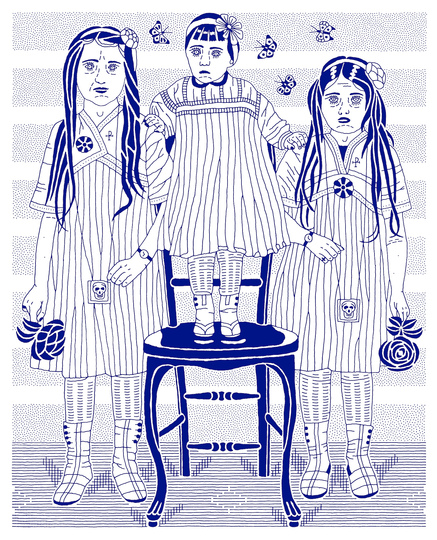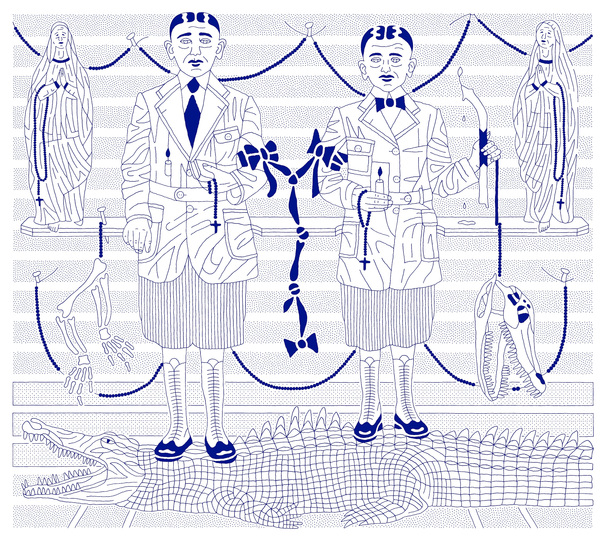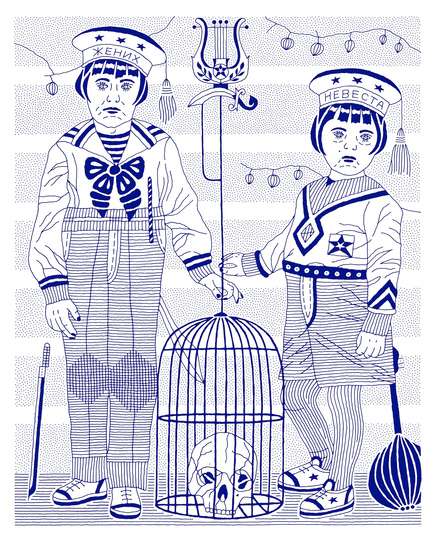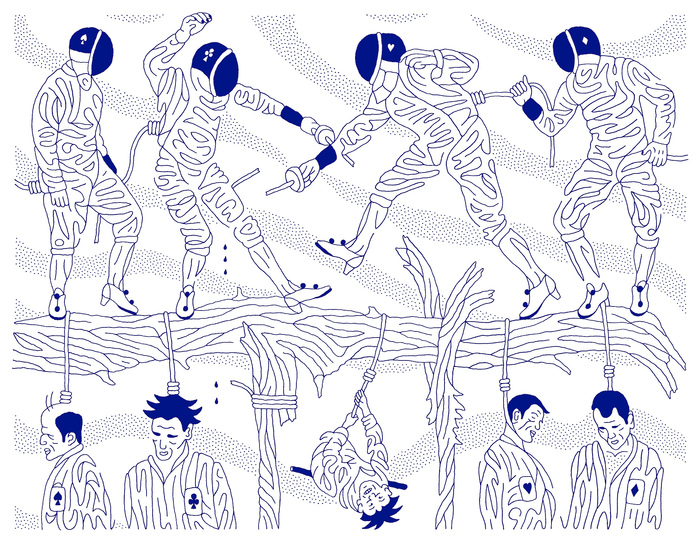Exiled from Truth: Nine Allegories by Dmitry Borshch
105 NY-110, Melville, NY 11747
July 10, 11 am – August 4, 7 pm
Tuesday – Saturday, 11 am – 7 pm, free admission
Please write to racc.ny@mail.ru or call (347) 662 1456
The artist is available for interviews
Russian American Cultural Center (RACC) presents "Exiled from Truth: Nine Allegories by Dmitry Borshch", an exhibition in close stylistic relationship with Borshch´s last exhibition, "Iconography". They are pendants related through style but not genre. About the newly exhibited series its author writes, "´Exiled from Truth: Nine Allegories´ is the title under which some allegorical pictures are collected, possibly more than nine: the series continues to develop. They are united by color, style, and technique, so I view them as a homogeneous collection of drawings. Allegory, drawn or written, is a product of that mind which regards truth as existing-in-absence: it does exist yet is absent from our view. Allegories like mine would not be needed if truth were openly present." "Iconography", a series that has evolved for almost nine years while retaining its cohesion, belongs to another genre. Inspired by prints after Anthony van Dyck’s drawings which collectively bear the same name, it includes portraits of living artists, writers, politicians, distinguished soldiers.
Dr. Regina Khidekel curated "Exiled from Truth" and "Iconography" at RACC´s new satellite space in Melville. Both exhibitions are supported by funds from the New York City Department of Cultural Affairs in partnership with the City Council.
Russian American Cultural Center (520 East 76th Street, Suite 7E New York, NY 10021) aims to provide permanent cultural representation to more than 700,000 Russian-speaking residents of New York. It was founded in 1998 by Dr. Regina Khidekel and earned its 501(c)(3) tax-exempt status in 1999. RACC has adopted and broadened the strategy of organizations like No Longer Empty (http://www.nolongerempty.org/) which invigorate neighborhoods by mounting exhibitions in their unutilized or temporarily underutilized spaces. Visitors coalesce around a space where art may never have been exhibited before.
Regina Khidekel received her PhD from St. Petersburg Academy of Fine Arts, became the director of that city´s Diaghilev Art Center in 1990, and in 1998 the founding director of the Russian American Cultural Center in New York. She is the author of "It´s the Real Thing" (1999, University of Minnesota Press), and has contributed essays to the following publications: "Lyubov Popova" (1994), "Lazar Khidekel: Suprematism and Architecture" (1995), "Sterligov Group: Paintings from Russia" (1995), "Russian Constructivist Roots: Present Concerns" (1997), "Forbidden Art" (1998), "Lev Meshberg" (1999), "Tamar Hirschl" (2000), "In Malevich´s Circle" (2000), "A Life of Colors" (2001), "Surviving Suprematism" (2004), "Family Album. Artists from St. Petersburg" (2006), "Anna Rochegova" (2008), "Homage to Diaghilev´s Enduring Legacy" (2009), "Trajectory of Suprematism" (2011), "Floating Worlds and Future Cities: Lazar Khidekel, Suprematism and Russian Avant-garde" (2013), "Building Drawings and Drawing Buildings" (2014), "Lazar Khidekel and Suprematism" (2014). She has lectured at many universities, and curated many exhibitions.
Dmitry Borshch was born in Dnepropetrovsk, studied in Moscow, today lives in New York. His drawings and sculptures have been exhibited at the National Arts Club (New York), Brecht Forum (New York), Exit Art (New York), CUNY Graduate Center (New York), Salmagundi Club (New York), ISE Cultural Foundation (New York), Williamsburg Art and Historical Center (New York), Triangle Arts Association (New York), Parish Art Museum (Southampton), International Human Rights Law Institute of DePaul University (Chicago), the State Russian Museum (Saint Petersburg), Central Exhibition Hall ´Manege´ (Saint Petersburg), Frieze Art Fair (London).
http://www.russianamericanculture.com/galleries/emerging-artists/dmitry-borshch/
Inspirations.
Writing & Design
Bohemian Bridges: California as a Superstructure for Social and Cultural Change. Writer and Designer...
De Stijl at Hundred and One
"De Stijl at Hundred and One"
105 NY-110, Melville, NY 11747
September 25, 11 am – October 20, 7 ...
Virus
VIRUS
The Joys of Ice Skating
That skating 400 years ago was one of the most popular winter activities in the Netherlands can be s...
Cutting the edges
Arctic Paper launches new swatch books for the brands Arctic, Amber and G-Print, as well as the two ...
The pattern of You
Each name results in a unique pattern. The pattern and colors created are unique to each name, and t...
Maurice Binder
Maurice Binder was a film title designer best known for his work on 14 James Bond films including th...
Neverending Graphics
Graphics and animations are generated on the fly, resulting in perpetual variations. Move your mouse...
Le Drugstore Brand Identity
Design&Practice designed the brand identity for the newly opened restaurant "Le Drugstore," with int...
Coffee maker
Visualization of the process of coffee making.
The aim was not to use words.
FASHION ADVERTISING
RESEARCH
ILLUSTRATION
RESEARCH
Geigy, Swiss and European Graphic Design
Selection of outstanding graphic design from Europe
Book : Monk
A book by Jonathan Monk.
Book : Tajima
A book by Mika Tajima.
Negative Entropy is a series of five abstract Jacquard woven portraits of in...
Book : Lewitt
A book by Sam Levitt.
TEMPLATE is a book whose information emerges under programmatic erasure. Or p...
Book : Baldessari
A book by John Baldessari.
Book : Armleder
A book by John Armleder.
Book : Mullican
A book by Matt Mullican.
Book : Weiner
A book by Lawrence Weiner.
Book : Cattelan
A book by Maurizio Cattelan.
Book : Brannon
A book by Matthew Brannon.
Home Patterns
“Home Patterns” is a new series of patterns by Longstory, designed for printing on textiles, wal...
The Menu
The food menu as we know it today is an invention of the 19th century. Traditionally, during a meal ...
What Is A Simulation?
What is a simulation?
It is a private game we devise when the aliveness of a situation is too comple...
The algorithm of fashion
Each of these scarf patterns is unique. The production workflow involves an algorithm which creates ...
Books of Memory: Gianpaolo Pagni
Gianpaolo Pagni creates unique, printed, painted or stamped books. His work focuses around memory an...
Groupe Garcia Ingénierie
Corporate identity. Marseille, France, 2015.
Akiko Masunaga
マスナガデザイン部/Art director/Designer/O型/乙女座
Management 7
7 thoughts on management: Paradox, Management, Hierarchy, Bureaucracy, Trust, Vision, Motivation. (C...
Tom Ngo
"Common sense and conventional practice prohibits the evolution of architecture. Through reproducing...
Visual Music
Viktor Hertz was born in Uppsala, Sweden, in 1983. In 2009, he started to do graphic design as a hob...
Ignite
"What I try to do is use technology to create representations of imagery found in nature. Technology...
ЯРОСЛАВ МИСОНЖНИКОВ: ODNOSVECHNIK
ODNOSVECHNIK is a candle holder in marble and wood.
Designer Yaroslav Misonzhnikov, born 1988 in ...
Liqen
Liqen was born in 1980, in Vigo, a port and industrial city of Galicia, in Spain. Since very little,...
Xavier Antin: Printing at Home
A printer manual to disturb and disrupt the printing process.
Xavier Antin, born in 1981, lives and ...
72 dpi
Images on the Internet are changing our lives. While images were once only reserved for a certain fe...
Áron Jancsó
“I’m a type addict. Building from scratch is how I like to work, sometimes even designing every ...
AG Frozoni: We need to aim at essential things
“We need to aim at essential things, to remove every redundant effects, every useless flowering, t...
Andrea Guccini: 4A+1
Andrea Guccini, born in Bologna in 1993, studied at the IED in Milan. He is living and working betw...
Julien Notter and Sébastien Vigne
Basé à Lausanne, Notter + Vigne est un atelier graphique fondé en 2002 par les designers Julien N...
Erwin Poell: Naturwissenschaft + Technik
Erwin Poell (1930) is a German graphic designer. From 1951 he studied with Walter Brudi at the State...
E. Hu
Eric Hu is an art director based in New York. He previously worked as the design lead at OKFocus. Er...
Opie
Julian Opie studied at Goldsmiths´ College (1979-82) under Michael Craig-Martin, for whom he briefl...
Make War, Not Love
Digitally printed charmeuse silk series 'Touchingly Unfeeling' by Jonathan Zawada.
Jonathan Zawada...
The Many Sides of the Moon
Variations on light refraction patterns through a prism, in a set-up reminding on the iconic cover o...
Antonio Rubino
Antonio Rubino: Pittore, illustratore e scrittore (Sanremo 1880 - Baiardo 1964). Legato all´art nou...
Sadamitsu Neil Fujita
Sadamitsu Fujita was born in Waimea, Hawaii to Japanese immigrants. He attended boarding school in H...
Stan Galli
Illustrator Stan Galli (1912 - 2009) attended the California School of Fine Arts and was recruited a...
L´Imparfaite by VLF
VLF studio is Thomas Cristiani and Antoine Roux in Paris.
Symphonie
Posters for the Symphonieorchester des Bayerischen Rundfunks. Bureau Mirko Borsche is a graphic desi...
Life Is Electric. Philippe Weisbecker
Born in 1942, Weisbecker studied interior design in Paris. By 1968 he moved to New York. First worki...
The 2015 best of penccil
This was an extraordinary year. The world went through a series of shocks and shake-ups, and in betw...
Hasui Kawase 川瀬 巴水
Hasui Kawase (1883 – 1957) , the best known proponents of the 新版画 New Prints movement, was ...
France 1661
Views of Renaissance France by Kasper Merian, 1655-1661
HORT
HORT was founded 1994 by Eike König in Berlin. Clients include WALLPAPER, NEW YORK TIMES, PROJECT F...
Erik Nitsche
Born on September 7, 1908, in Lausanne, Switzerland, Erik Nitsche attended the Kunstgewerbeschule in...
What You Think You Know
Philip Herrman is graphic designer in Zurich, Switzerland. Clients include Reto Geiser for Standpunk...
Sweets by 若杉 智也
Spin it
Posters by London-based graphic design studio Spin.
Ink kisses paper
Grant Dickson, born in Belfast, 1974, studied Graphic Design at Nottingham Trent University (1994-97...
RGB Studio
RGB Studio is Rob Brearley, a graphic designer & art director based in Leeds UK. He continues to dev...
長嶋りかこ Rikako Nagashima グラフィックデザイナー Founder / Graphic designer
邵 年 Shao Nian
Graphic designer Shao Nian, born 1993, is co-founder of Orgasm studio and owner of slow salon. He li...
Russian Modernism
Russian architectural sketches from the nineteen-twenties.
Pavel Tchelitchew: Spiral head
Pavel Tchelitchew (Па́вел Фёдорович Чели́щев) (1898 - 1957) was a surrealist ...
Nikolai Lutohin
Nikolai Lutohin (1932 - 2000) was born in Yugoslavia as the son of Russian parents. Already as a fiv...
Shin Dokho
Shin Dokho, graphic designer.
Laucke Siebein, Amsterdam and Berlin
Studio Laucke Siebein is a design studio based in Amsterdam and Berlin. Dirk Laucke (1965) – born ...
TAKEO 竹尾纸张展
余剑兄从日本传来最新的展览资讯-TAKEO 竹尾纸张展,一家日本老牌的纸品制...
also:
Squares
Square work
Eden
Paper sculpture
SPACEGIRL - COLOUR & EFFECTS
This is SPACEGIRL all coloured up with a few little effects added for good measure.
McDEAD ..and lovin' it!
In Australia we call McDonalds - Maccas.
Maccas holds a special place in my heart... it's called cho...
MILEY CYRUS is a ZOMBIE
This is an unused piece for the Australian comic ZOMBIE CITIES by Zorab del Rio.
I can understand to...
TOKYO ZOMBIES
This is the inks for TOKYO ZOMBIES,
a piece I did for the Australian comic called ZOMBIE CITIES by ...
SPACE GIRL
Comic Art, Illustration, Art, Line Art, Brush, Comics.
HOGAR, DULCE HOGAR
Collage
EL PAPEL DE LA FAMILIA
Ilustraciones para artículo: El Papel de la Familia (Hospital Sant Joan de Déu) 2023
PINTAORA
Painting
Surface N° 2
Arctic Paper presents Surface N° 2 – a second edition featuring a specially curated selection of ...
CryptoBlues, Offline
"CryptoBlues, Offline"
121205, Moscow, Skolkovo Innovation Center
Nobel Street, Building 7, Floor ...
The Frenchness of Russian Art: Montaigne and Death
"The Frenchness of Russian Art: Montaigne and Death"
105 NY-110, Melville, NY 11747
September 13, 1...
The painted house
These experimental structures have been created by combining design processes of architecture and gr...
SCARABOOK
SCARABOOK is the combination of Scarabottolo and the English word book (but perhaps we ought to say ...
My calendar
I start to make it in 2000, the year in which the future has passed, at the request of Adriano Mei G...
71 views of the magic mountain
In the days of the first lockdown I started making these drawings, remotely inspired by Hokusai´s "...
on paper books and e-books
these drawings were made thinking about what is happening to the books through various titles of cla...
Ebb and Flow
This student design project smartly uses paper to give shape to the intertidal coastline of Taiwan, ...
Culinary Tradition
Four examples of contemporary food packaging designs inspired by traditional Chinese patterns and gr...
TRIAL
Old-school postal packaging usually gets little attention from graphic designers. Not so in this fun...
Archip-elles
Swiss graphic designers We Play created this pop-art inspired, fun poster series for the Archipelles...
Kids House
For Inwayi Kids House in Ningbo City, China, designer Nono Xia of graphic design studio Ninemix cam...
Origami envelopes
Origami Envelopes have a special place in Japanese gift-giving culture. The four envelopes here rep...
Les Concerts du mercredi
The idea of Swiss based graphic design practice We Play Design for these posters for Les Concerts du...
Tatsuo Miyajima: Being Coming
Although this is for an exhibition of Japanese contemporary artist Tatsuo Miyajima at Shanghai Minsh...
Yokohama Museum of Art Calendar
Graphic designers Aizawa office from Yokohama designed this wall calendar. With its unassuming but a...
Pulp Fiction
A selection of American and Mexican Pulp Fiction covers from the nineteen-forties.
Synthetic Paradise
Generative music combined with abstract graphics. Click the screen to generate new graphics:
https:/...
Surrealism
Inspired by Surrealism and some of the artists of that time (such as Dali or Ernst), I created basic...
Back in the USSR
Great retro logos from the old USSR, and a Beatles song.
https://soundcloud.com/thebeatlesrevisited...
Faces by 田中 一光 Ikko Tanaka
Inspired by the Bauhaus, by Jazz and by American graphic design, Ikko Tanaka (1930-2002) was one of ...
penccil
Concept, branding, design and coding of penccil, the site for creative people, studios and gallerie...
Pattern generator
A generator for tile and fabric patterns. Drag and drop images and see kaleidoscopic patterns emerge...
Cognition
This experiment looks at the process of human cognition. Letters get progressively filled with color...
Soviet Lives of Uncle Tom
"Soviet Lives of Uncle Tom"
105 NY-110, Melville, NY 11747
February 4, 11 am – March 1, 7 pm
Mond...
"Turkish past, Ottoman present" and "Spengler in Turkey"
"Turkish past, Ottoman present" and "Spengler in Turkey"
105 NY-110, Melville, NY 11747
August 5, 1...
Writing & Design
Birdee, Tweet! Writer and Illustrator.
Writing & Design
Bohemian Crossroads: Art & Culture Collide Then Subside. Writer and Designer.
Writing & Design
Bohemian Highways: Abide Then Divide Along the California Coast. Writer and Designer.
Writing & Design
Horizon Homes: Living a Concrete Dream. Writer and Designer, Ted Wells.
Writing & Design
Artists Abroad: A Woman´s Journey to Discover the Artists. Writer and Illustrator.
Technical skill is mastery of complexity, while creativity is mastery of simplicity.
— Christopher Zeeman
— Christopher Zeeman
- penccil is free.
- No trackers. No cookies.
Just creativity.





